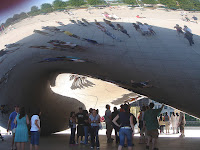On
the first day of class, a student mentioned the “Chicago Bean” as something
they knew about Chicago. I had
never heard or seen the bean before, so I wanted to find out more.
Nicknamed
“The Bean,” the structure is officially titled “Cloud Gate.” It is located in AT&T Plaza in
Millennium Park. Anish Kapoor, an
Indian-born British artist, beat out 30 other artists to implement the
piece. The Bean, which finished
construction in 2004, weighs 110 tons and is 33 feet high and 66 feet and it’s
maximum height and length and is made entirely of stainless steel.
Kapoor
named the structure Cloud Gate because 80% of the sculpture’s surface reflects
the sky above. However, it
received its nickname of “The Bean” from its kidney bean shape. What makes the structure so unique is
the way in which it reflects and “captures the feel of the city,” while also
involving the viewer. Cloud Gate
reflects the city’s famous skyline, celebrating the economic power of the
city. However, it also reflects
the people and culture of the city by reflecting the people who view and pass
by the structure. Just as the scene reflected on the Bean
is always changing, the bustling city of Chicago is always changing due to
economic, social, and cultural patterns.
 Thinking
about this reminded me of our discussions of the varying peoples that have
historically made up Chicago. Whether
it was the influx of people via the railroad that transformed Chicago into the
Metropolis it is today, or German and Irish immigrants, or southern black and
white migrants, Chicago has always been a diverse city formed and influenced by
its people. This idea is thoroughly
expressed in the way the structure physically reflects the city - a city of varying
people, a rich and historical culture, and economic prowess.
Thinking
about this reminded me of our discussions of the varying peoples that have
historically made up Chicago. Whether
it was the influx of people via the railroad that transformed Chicago into the
Metropolis it is today, or German and Irish immigrants, or southern black and
white migrants, Chicago has always been a diverse city formed and influenced by
its people. This idea is thoroughly
expressed in the way the structure physically reflects the city - a city of varying
people, a rich and historical culture, and economic prowess.
Sources:
http://www.chicagoarchitecture.info/Building/636/Cloud-Gate.php
http://www.guardian.co.uk/artanddesign/2008/nov/08/anish-kapoor-interview
_from_east'.jpg)
No comments:
Post a Comment